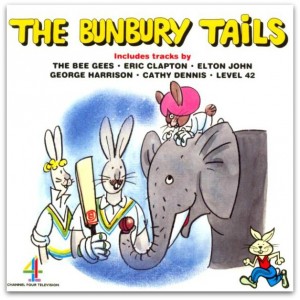The Bunburys: weirdest supergroup in music history?
 The Bee Gees continued to rack up hits until disco waned in popularity in 1980 and took them with it. The trio moved into songwriting (notable hit: the 1984 #1 hit “Islands in the Stream” by Dolly Parton and Kenny Rogers), but in the mid-‘80s wanted to make a performing comeback. Solution: form a supergroup by adding a fourth member.
The Bee Gees continued to rack up hits until disco waned in popularity in 1980 and took them with it. The trio moved into songwriting (notable hit: the 1984 #1 hit “Islands in the Stream” by Dolly Parton and Kenny Rogers), but in the mid-‘80s wanted to make a performing comeback. Solution: form a supergroup by adding a fourth member.
This wasn’t the first time the Bee Gees had considered a supergroup. Andy Gibb, the young brother of all three members of the Bee Gees, and pop singer in his own right, was reportedly considering joining the group. In 1988, he died of a heart attack at age 30. Another option was Peter Frampton, with whom the Bee Gees had starred and performed with in the 1978 mega-flop Sgt. Pepper’s Lonely Hearts Club Band. Frampton, heading into the movie after the massive success of Frampton Comes Alive, suffered permanent career setbacks.
The man they went with: Eric Clapton. It’s not as inexplicable as it sounds. The Gibbs and Clapton had known each other since the early ‘70s, and there was overlap among managers, record labels, and backing musicians. In fact, Clapton was somewhat responsible for the Bee Gees successful comeback in the late ‘70s. In 1974, Clapton scored a hit with 461 Ocean Boulevard, named after the house in Miami where he’d recorded the album. It revitalized him, and he recommended the Gibbs to move to Miami, too. They did, and while there recorded “Jive Talkin’” which reinvented the pop-rock group as a disco band.
Clapton and the Bee Gees got together, but mainly for charity. The supergroup called itself The Bunburys, and recorded three songs for a charity album with the proceeds going to The Bunbury Cricket Club, which plays exhibition cricket matches to raise money for nonprofit organizations in England. The Bunburys recorded three songs for The Bunbury Tails: “Fight the Good Fight,” “Bunbury Afternoon,” and “We’re the Bunburys.” It’s a very rare CD, and hard to find, although the band did have a bit of commercial success. “Fight (No Matter How Long)” also appeared on The 1988 Summer Olympics Album, and went to #8 on the rock music chart…the first and only appearance on that chart by the Bee Gees.







